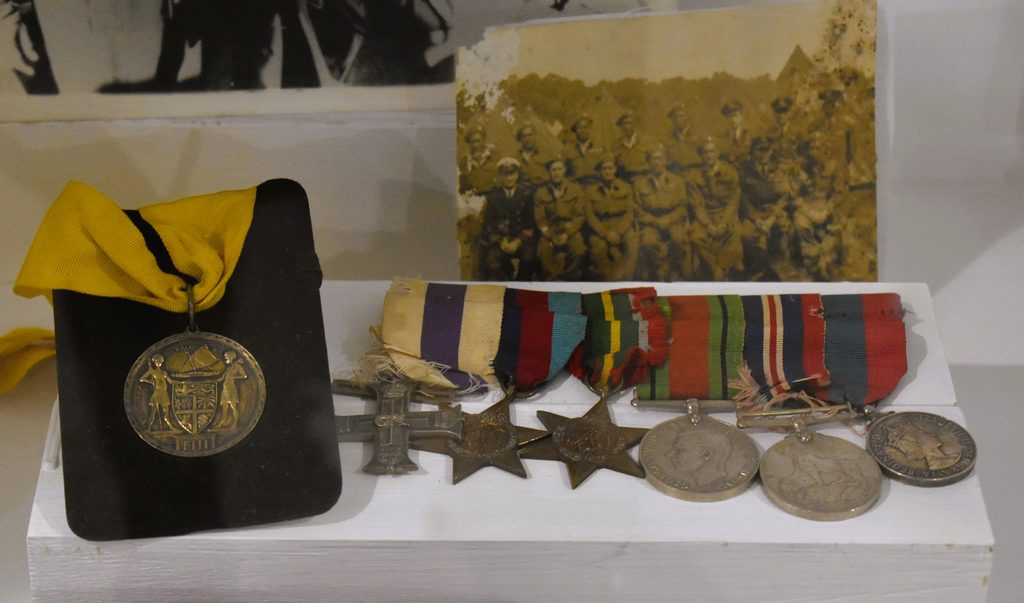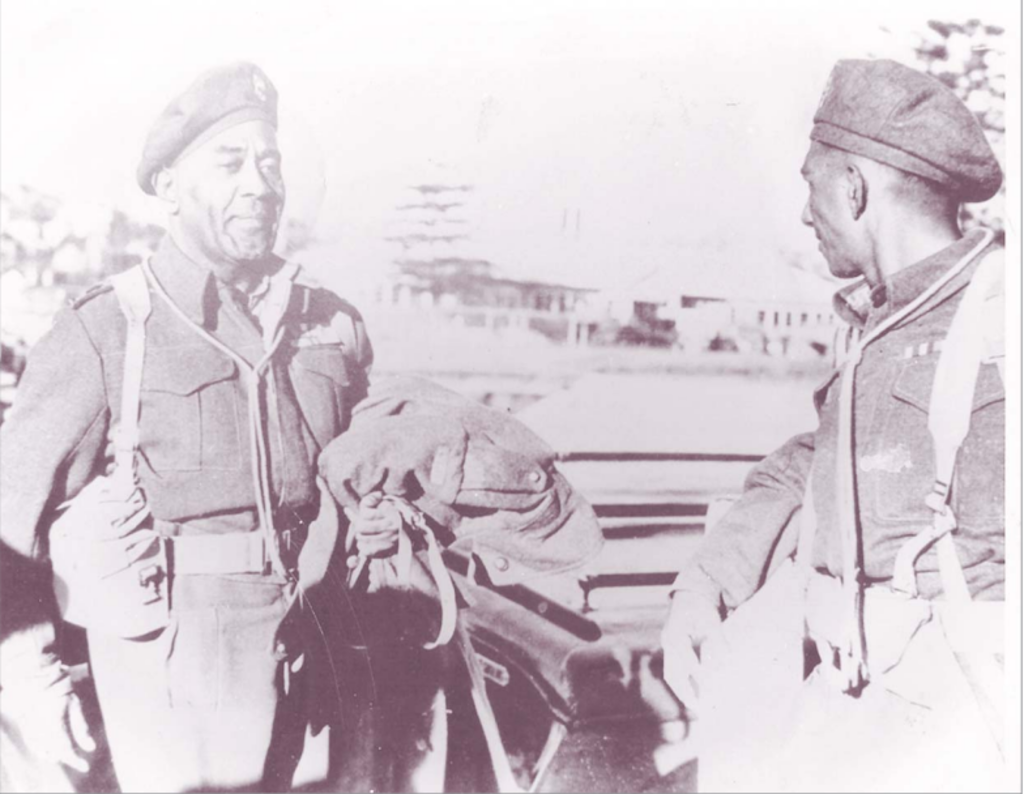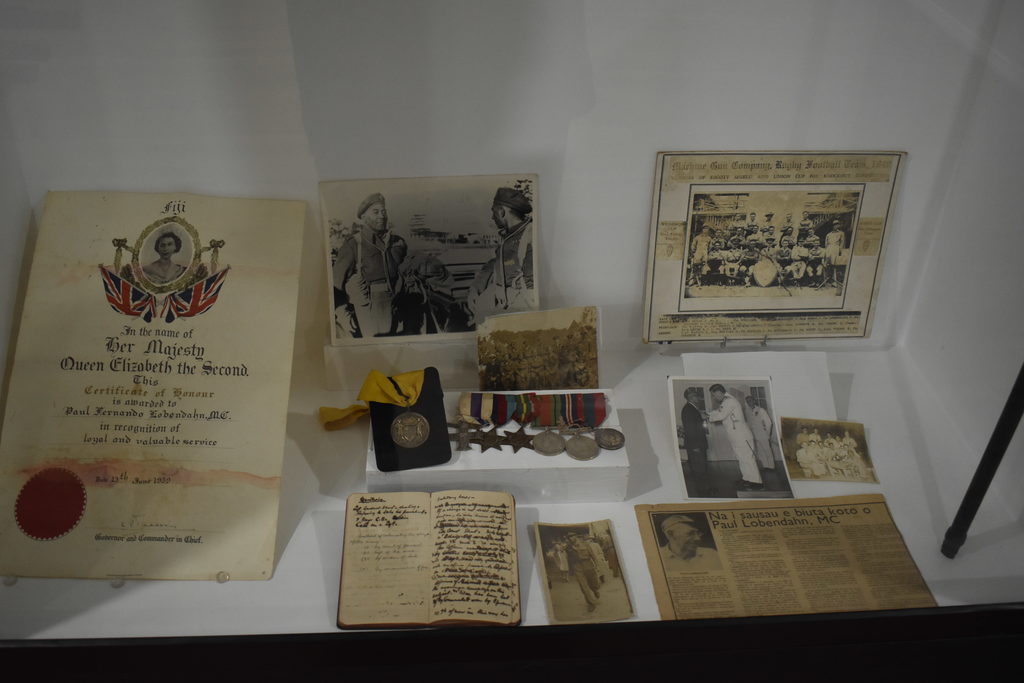Given that the nation has just commemorated the life of the late Ratu Sir Lala Sukuna, a distinguished soldier of his time, this week we look back at the remarkable story of Paul Lobendahn MC, nearly four decades after his passing in June 1985.
He was a decorated veteran of the Solomon Islands campaign.
Following his death, his medals and personal effects were entrusted to his son, Gilbert Lobendahn, of Sydney, Australia.
For over 20 years, these artefacts remained overseas before the majority were returned to Fiji under the care of his eldest son, Vincent Lobendahn Snr, of Lami. After a decade in Fiji, the collection was briefly moved to Europe and later to New Zealand, where attempts to donate them to the Auckland War Memorial Museum were unsuccessful.
“My only memory of my grandfather is the heavy rain at his funeral, the large crowd gathered, and the haunting sound of the Last Post played by a soldier from the Fiji Military Forces,” recalled Vincent Lobendahn Jnr.
For years, the collection remained sealed, hidden from public view.
Today, after a long journey across continents, Paul Lobendahn’s medals and memorabilia are now on display at the Fiji Museum, ensuring the preservation of the memory of a man who gave his life for Fiji.
A humble yet extraordinary life
Paul Fernando Lobendahn was born on June 7, 1906 in Suva, the third eldest of 14 siblings. Raised in Oneta, Ono, Kadavu, he spoke only Samoan and the Kadavu dialect until he returned to Suva at the age of eight or nine to begin his education.
He learned English and later joined the Government Printing Service, continuing a family tradition deeply rooted in Fiji’s printing industry.
His father, Vincent Fredrick Lobendahn, had arrived in Fiji in 1894 as a compositor for the Government Printers.
Paul and his brothers—Harry, Dick, and later their sons—became renowned experts in printing and bookbinding. The Lobendahn name also became synonymous with the Public Works Department, with several family members contributing as welders, boilermakers and builders.
The Solomons campaign
When war reached the Pacific in the early 1940s, Paul and his brothers answered the call to serve. Enlisting as a private in the Fiji Defence Force (forerunner of the Royal Fiji Military Forces) on February 23, 1940, Paul rose through the ranks, earning a commission as an officer by December 1, 1943.
His leadership and courage behind enemy lines earned him the Military Cross. The citation, dated December 9, 1944, praised his “outstanding ability as a platoon commander” and his unwavering bravery.
“In a series of operations beyond the Torokina perimeter between April and June 1944, Second Lieutenant Lobendahn displayed exceptional leadership. His platoon accounted for 17 Japanese casualties and played a crucial role in ensuring the safe return of his company with minimal losses.”
“On multiple patrols, he ventured deep into enemy territory, gathering vital intelligence that shaped the battalion’s strategy. His disregard for personal safety and relentless presence at the front inspired his men.”
In 1946, Paul was selected to represent Fiji at the Victory Parade in London, where he also took the opportunity to explore the city’s historic landmarks.
Among the memorabilia now housed at the Fiji Museum is his 1943 officer’s notebook, a meticulously kept record of battle strategies, enemy positions, and medical notes, which speaks volumes of his precision and discipline.
Despite his distinguished service, Paul’s attempt to join the Malaya campaign in 1951 was declined due to his age.
A lifetime of service
After the war, Paul returned to the Government Printing Office, retiring in 1967 as Superintendent (Binding) after 45 years of extraordinary service.
He then joined The Fiji Times and Herald, working alongside his brothers and nephew—marking three generations of Lobendahns in Fiji’s printing industry.
His contributions extended beyond his profession. A close associate of Ratu Sir Lala Sukuna and Ratu Sir Edward Cakobau, Paul was instrumental in Fiji’s credit union movement, serving as a trustee for the Fiji Credit Union League and the Bergengren Credit Union Training Centre.
He dedicated 37 years to the Ex-Servicemen’s After-Care Fund, 13 of them as chairman. He also served on the Suva Grammar School Board of Governors.
His commitment to public service was recognised with the Certificate of Honour in the 1956 Queen’s Birthday Awards and the Imperial Service Medal in 1967.
“Paul’s humility and dedication exemplify the true spirit of service,” said Vincent Lobendahn Jnr.
“His bravery in the Solomon Islands, his attempt to serve in Malaya, and his lifelong commitment to Fiji’s development are a testament to his character.”
The display of his memorabilia at the Fiji Museum ensures that his story and Fiji’s military history will endure.
“With our family scattered across the globe, this allows future generations to connect with their heritage,” Vincent added.
“Paul’s legacy is not just ours—it belongs to Fiji.”
The late Paul Lobendahn MC was a recipient of the posthumous Military Cross — seen here with a white and purple coloured ribbon.
Picture: ALIFERETI SAKIASI

Left: Victory Parade celebrations in London (1946) with Ratu Sir Lala Sukuna (left) and Paul Lobendahn (right). A copy of this photograph is with the Fiji Museum. Picture: SUPPLIED

